Organizational Behavior Report: Tesco, Culture, Motivation, and Teams
VerifiedAdded on 2020/10/22
|13
|3434
|340
Report
AI Summary
This report provides an analysis of organizational behavior, focusing on the case study of Tesco. The introduction highlights the importance of understanding individual behavior in a competitive environment. The report explores the influence of organizational culture, power, and politics on employee behavior, differentiating between various cultural models such as power, role, task, and person cultures, with a specific emphasis on Tesco's role culture. It then delves into content and process theories of motivation, including Maslow's and Herzberg's theories, as well as expectancy and goal-setting theories, illustrating how Tesco applies these theories to motivate its workforce. Furthermore, the report discusses the factors that contribute to effective team performance, referencing Tuckman's stages of team development and highlighting the significance of communication, team size, rewards, and team stability. Finally, it examines the concepts and philosophies of organizational behavior, emphasizing aspects like perception, motivation, human dignity, and holistic approaches, and concludes with a summary of the findings and references.
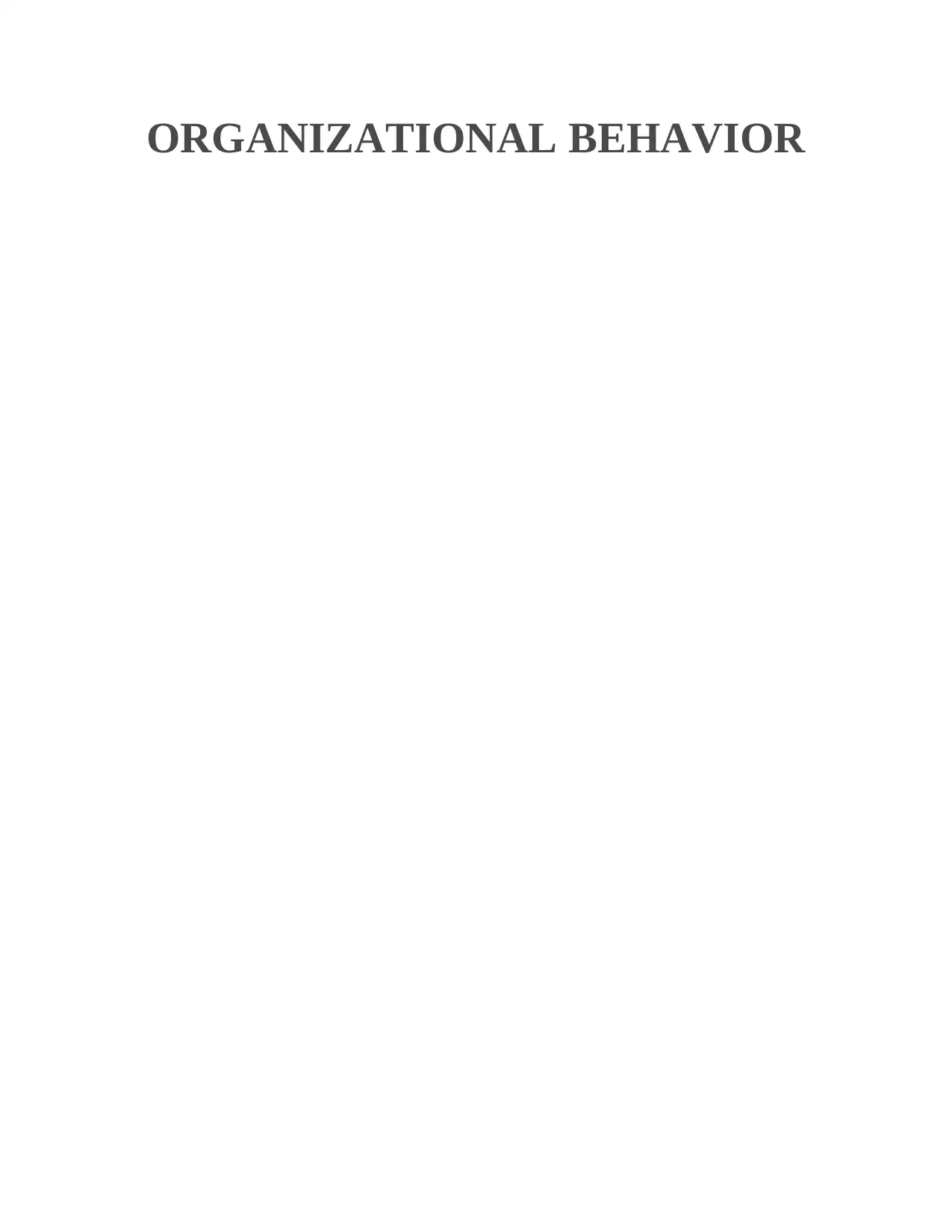
ORGANIZATIONAL BEHAVIOR
Paraphrase This Document
Need a fresh take? Get an instant paraphrase of this document with our AI Paraphraser
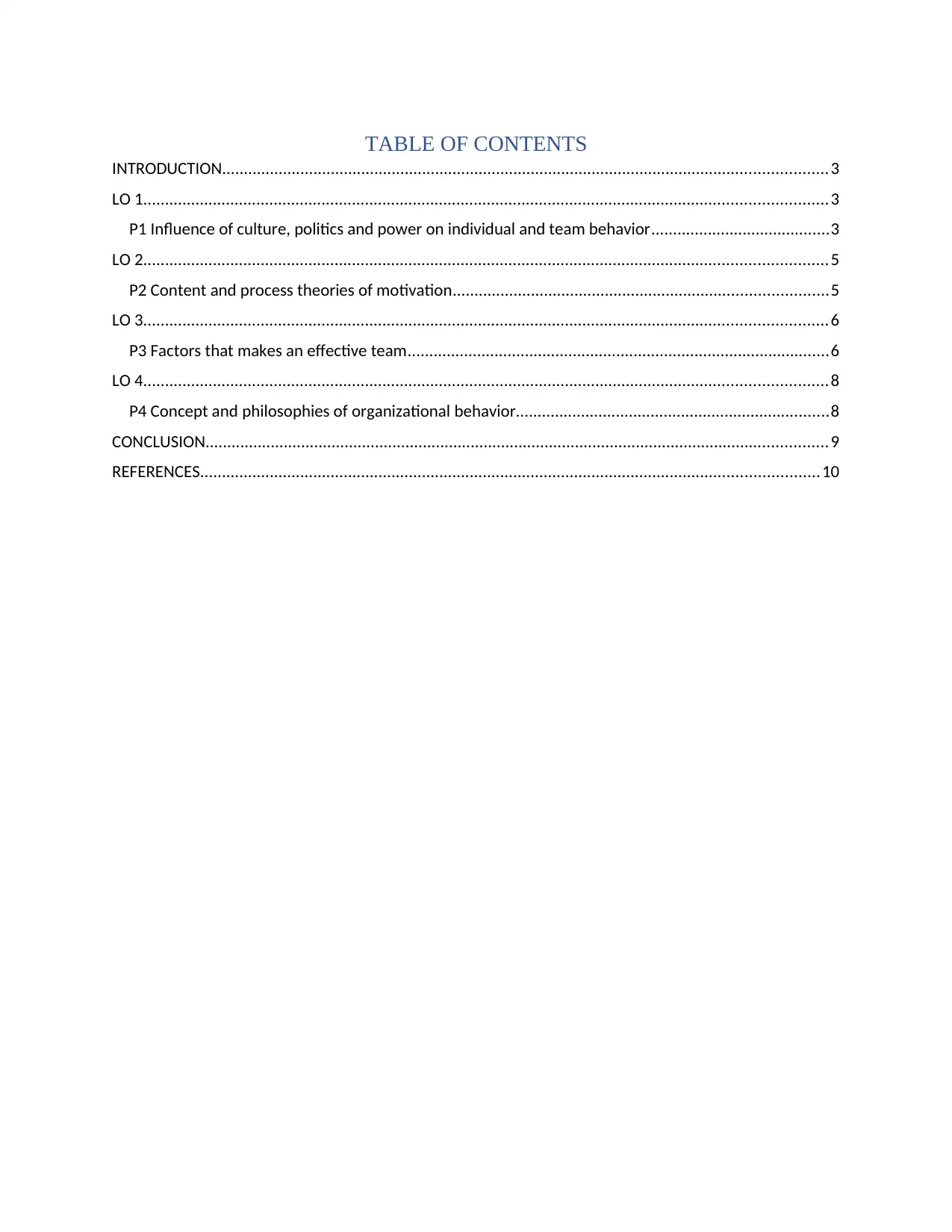
TABLE OF CONTENTS
INTRODUCTION...........................................................................................................................................3
LO 1.............................................................................................................................................................3
P1 Influence of culture, politics and power on individual and team behavior.........................................3
LO 2.............................................................................................................................................................5
P2 Content and process theories of motivation......................................................................................5
LO 3.............................................................................................................................................................6
P3 Factors that makes an effective team.................................................................................................6
LO 4.............................................................................................................................................................8
P4 Concept and philosophies of organizational behavior........................................................................8
CONCLUSION...............................................................................................................................................9
REFERENCES..............................................................................................................................................10
INTRODUCTION...........................................................................................................................................3
LO 1.............................................................................................................................................................3
P1 Influence of culture, politics and power on individual and team behavior.........................................3
LO 2.............................................................................................................................................................5
P2 Content and process theories of motivation......................................................................................5
LO 3.............................................................................................................................................................6
P3 Factors that makes an effective team.................................................................................................6
LO 4.............................................................................................................................................................8
P4 Concept and philosophies of organizational behavior........................................................................8
CONCLUSION...............................................................................................................................................9
REFERENCES..............................................................................................................................................10
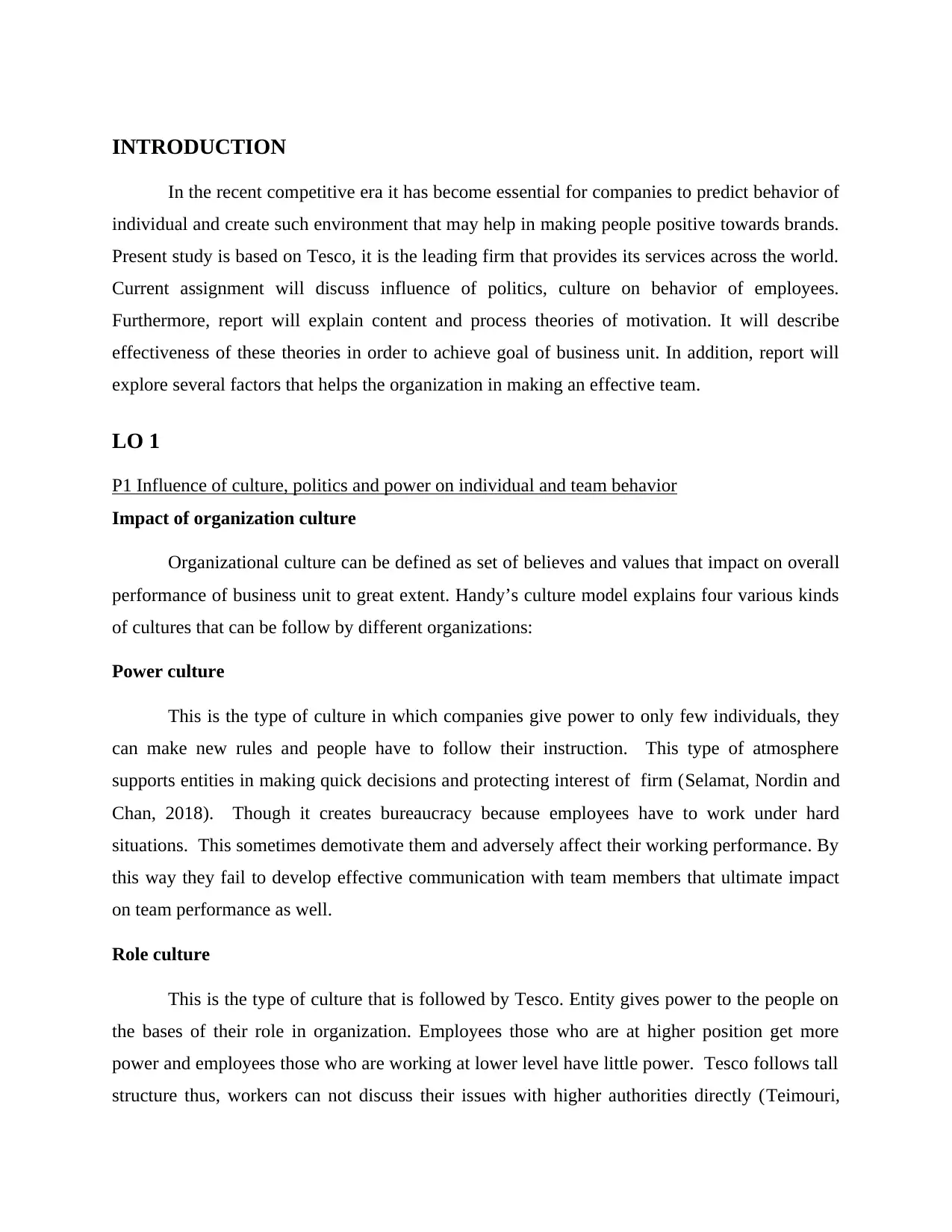
INTRODUCTION
In the recent competitive era it has become essential for companies to predict behavior of
individual and create such environment that may help in making people positive towards brands.
Present study is based on Tesco, it is the leading firm that provides its services across the world.
Current assignment will discuss influence of politics, culture on behavior of employees.
Furthermore, report will explain content and process theories of motivation. It will describe
effectiveness of these theories in order to achieve goal of business unit. In addition, report will
explore several factors that helps the organization in making an effective team.
LO 1
P1 Influence of culture, politics and power on individual and team behavior
Impact of organization culture
Organizational culture can be defined as set of believes and values that impact on overall
performance of business unit to great extent. Handy’s culture model explains four various kinds
of cultures that can be follow by different organizations:
Power culture
This is the type of culture in which companies give power to only few individuals, they
can make new rules and people have to follow their instruction. This type of atmosphere
supports entities in making quick decisions and protecting interest of firm (Selamat, Nordin and
Chan, 2018). Though it creates bureaucracy because employees have to work under hard
situations. This sometimes demotivate them and adversely affect their working performance. By
this way they fail to develop effective communication with team members that ultimate impact
on team performance as well.
Role culture
This is the type of culture that is followed by Tesco. Entity gives power to the people on
the bases of their role in organization. Employees those who are at higher position get more
power and employees those who are working at lower level have little power. Tesco follows tall
structure thus, workers can not discuss their issues with higher authorities directly (Teimouri,
In the recent competitive era it has become essential for companies to predict behavior of
individual and create such environment that may help in making people positive towards brands.
Present study is based on Tesco, it is the leading firm that provides its services across the world.
Current assignment will discuss influence of politics, culture on behavior of employees.
Furthermore, report will explain content and process theories of motivation. It will describe
effectiveness of these theories in order to achieve goal of business unit. In addition, report will
explore several factors that helps the organization in making an effective team.
LO 1
P1 Influence of culture, politics and power on individual and team behavior
Impact of organization culture
Organizational culture can be defined as set of believes and values that impact on overall
performance of business unit to great extent. Handy’s culture model explains four various kinds
of cultures that can be follow by different organizations:
Power culture
This is the type of culture in which companies give power to only few individuals, they
can make new rules and people have to follow their instruction. This type of atmosphere
supports entities in making quick decisions and protecting interest of firm (Selamat, Nordin and
Chan, 2018). Though it creates bureaucracy because employees have to work under hard
situations. This sometimes demotivate them and adversely affect their working performance. By
this way they fail to develop effective communication with team members that ultimate impact
on team performance as well.
Role culture
This is the type of culture that is followed by Tesco. Entity gives power to the people on
the bases of their role in organization. Employees those who are at higher position get more
power and employees those who are working at lower level have little power. Tesco follows tall
structure thus, workers can not discuss their issues with higher authorities directly (Teimouri,
⊘ This is a preview!⊘
Do you want full access?
Subscribe today to unlock all pages.

Trusted by 1+ million students worldwide
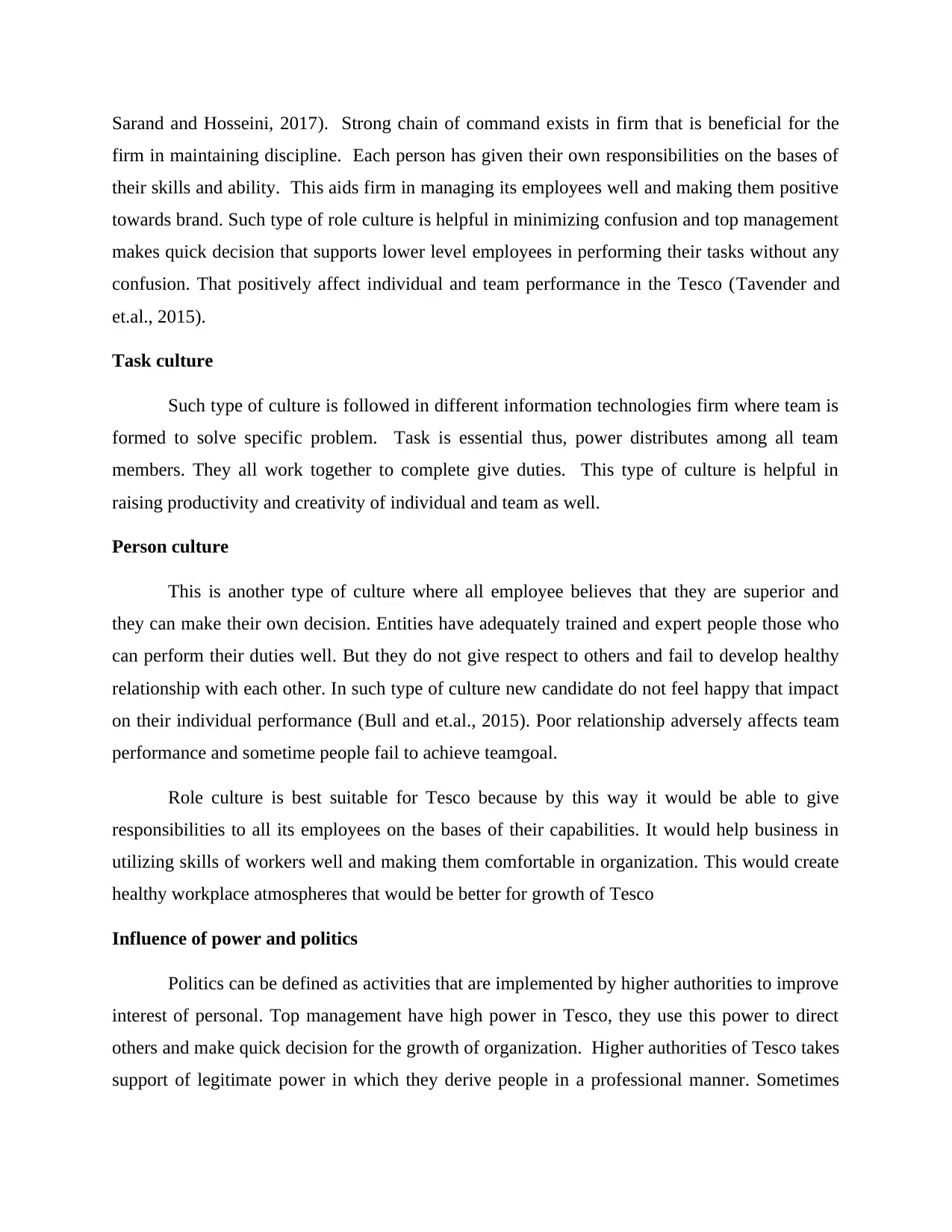
Sarand and Hosseini, 2017). Strong chain of command exists in firm that is beneficial for the
firm in maintaining discipline. Each person has given their own responsibilities on the bases of
their skills and ability. This aids firm in managing its employees well and making them positive
towards brand. Such type of role culture is helpful in minimizing confusion and top management
makes quick decision that supports lower level employees in performing their tasks without any
confusion. That positively affect individual and team performance in the Tesco (Tavender and
et.al., 2015).
Task culture
Such type of culture is followed in different information technologies firm where team is
formed to solve specific problem. Task is essential thus, power distributes among all team
members. They all work together to complete give duties. This type of culture is helpful in
raising productivity and creativity of individual and team as well.
Person culture
This is another type of culture where all employee believes that they are superior and
they can make their own decision. Entities have adequately trained and expert people those who
can perform their duties well. But they do not give respect to others and fail to develop healthy
relationship with each other. In such type of culture new candidate do not feel happy that impact
on their individual performance (Bull and et.al., 2015). Poor relationship adversely affects team
performance and sometime people fail to achieve teamgoal.
Role culture is best suitable for Tesco because by this way it would be able to give
responsibilities to all its employees on the bases of their capabilities. It would help business in
utilizing skills of workers well and making them comfortable in organization. This would create
healthy workplace atmospheres that would be better for growth of Tesco
Influence of power and politics
Politics can be defined as activities that are implemented by higher authorities to improve
interest of personal. Top management have high power in Tesco, they use this power to direct
others and make quick decision for the growth of organization. Higher authorities of Tesco takes
support of legitimate power in which they derive people in a professional manner. Sometimes
firm in maintaining discipline. Each person has given their own responsibilities on the bases of
their skills and ability. This aids firm in managing its employees well and making them positive
towards brand. Such type of role culture is helpful in minimizing confusion and top management
makes quick decision that supports lower level employees in performing their tasks without any
confusion. That positively affect individual and team performance in the Tesco (Tavender and
et.al., 2015).
Task culture
Such type of culture is followed in different information technologies firm where team is
formed to solve specific problem. Task is essential thus, power distributes among all team
members. They all work together to complete give duties. This type of culture is helpful in
raising productivity and creativity of individual and team as well.
Person culture
This is another type of culture where all employee believes that they are superior and
they can make their own decision. Entities have adequately trained and expert people those who
can perform their duties well. But they do not give respect to others and fail to develop healthy
relationship with each other. In such type of culture new candidate do not feel happy that impact
on their individual performance (Bull and et.al., 2015). Poor relationship adversely affects team
performance and sometime people fail to achieve teamgoal.
Role culture is best suitable for Tesco because by this way it would be able to give
responsibilities to all its employees on the bases of their capabilities. It would help business in
utilizing skills of workers well and making them comfortable in organization. This would create
healthy workplace atmospheres that would be better for growth of Tesco
Influence of power and politics
Politics can be defined as activities that are implemented by higher authorities to improve
interest of personal. Top management have high power in Tesco, they use this power to direct
others and make quick decision for the growth of organization. Higher authorities of Tesco takes
support of legitimate power in which they derive people in a professional manner. Sometimes
Paraphrase This Document
Need a fresh take? Get an instant paraphrase of this document with our AI Paraphraser
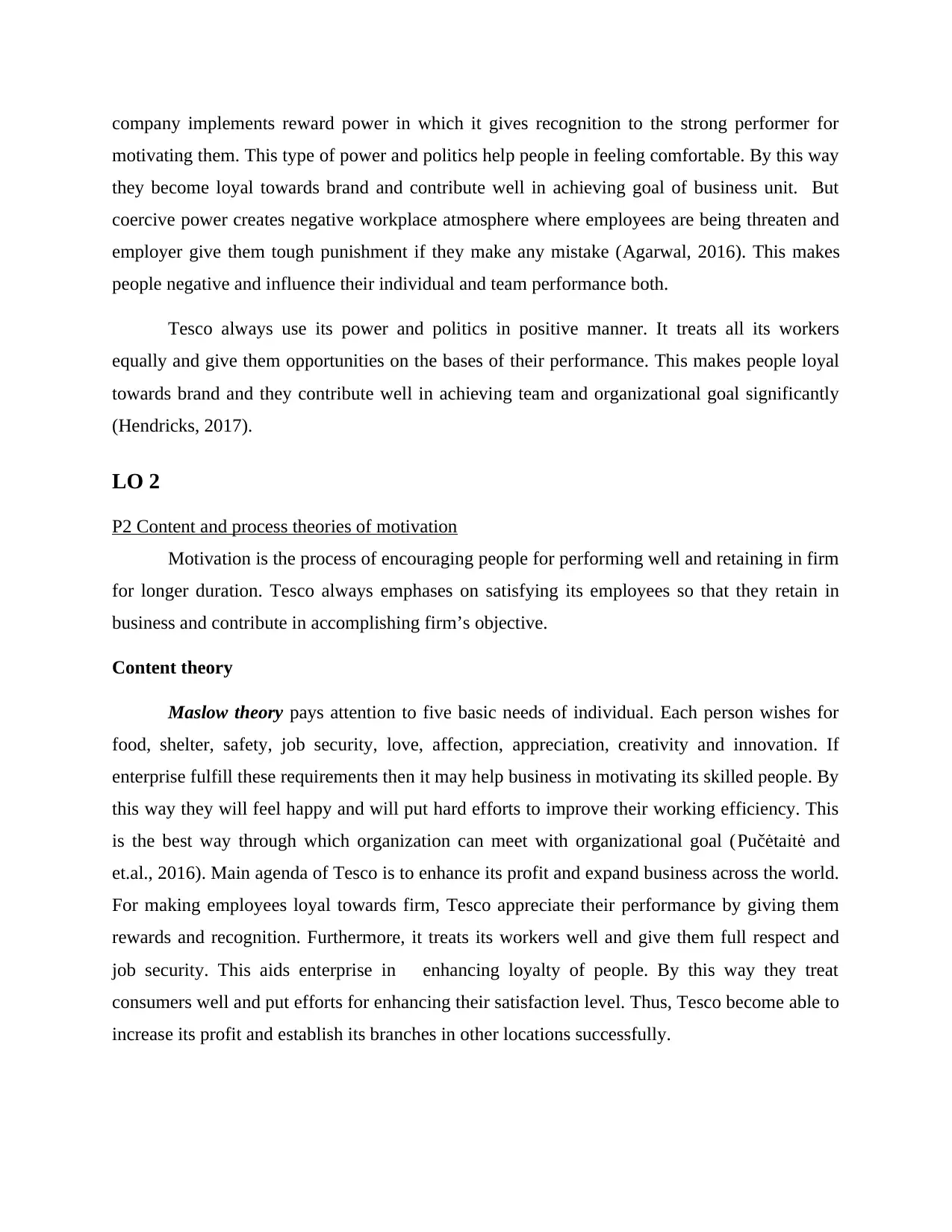
company implements reward power in which it gives recognition to the strong performer for
motivating them. This type of power and politics help people in feeling comfortable. By this way
they become loyal towards brand and contribute well in achieving goal of business unit. But
coercive power creates negative workplace atmosphere where employees are being threaten and
employer give them tough punishment if they make any mistake (Agarwal, 2016). This makes
people negative and influence their individual and team performance both.
Tesco always use its power and politics in positive manner. It treats all its workers
equally and give them opportunities on the bases of their performance. This makes people loyal
towards brand and they contribute well in achieving team and organizational goal significantly
(Hendricks, 2017).
LO 2
P2 Content and process theories of motivation
Motivation is the process of encouraging people for performing well and retaining in firm
for longer duration. Tesco always emphases on satisfying its employees so that they retain in
business and contribute in accomplishing firm’s objective.
Content theory
Maslow theory pays attention to five basic needs of individual. Each person wishes for
food, shelter, safety, job security, love, affection, appreciation, creativity and innovation. If
enterprise fulfill these requirements then it may help business in motivating its skilled people. By
this way they will feel happy and will put hard efforts to improve their working efficiency. This
is the best way through which organization can meet with organizational goal (Pučėtaitė and
et.al., 2016). Main agenda of Tesco is to enhance its profit and expand business across the world.
For making employees loyal towards firm, Tesco appreciate their performance by giving them
rewards and recognition. Furthermore, it treats its workers well and give them full respect and
job security. This aids enterprise in enhancing loyalty of people. By this way they treat
consumers well and put efforts for enhancing their satisfaction level. Thus, Tesco become able to
increase its profit and establish its branches in other locations successfully.
motivating them. This type of power and politics help people in feeling comfortable. By this way
they become loyal towards brand and contribute well in achieving goal of business unit. But
coercive power creates negative workplace atmosphere where employees are being threaten and
employer give them tough punishment if they make any mistake (Agarwal, 2016). This makes
people negative and influence their individual and team performance both.
Tesco always use its power and politics in positive manner. It treats all its workers
equally and give them opportunities on the bases of their performance. This makes people loyal
towards brand and they contribute well in achieving team and organizational goal significantly
(Hendricks, 2017).
LO 2
P2 Content and process theories of motivation
Motivation is the process of encouraging people for performing well and retaining in firm
for longer duration. Tesco always emphases on satisfying its employees so that they retain in
business and contribute in accomplishing firm’s objective.
Content theory
Maslow theory pays attention to five basic needs of individual. Each person wishes for
food, shelter, safety, job security, love, affection, appreciation, creativity and innovation. If
enterprise fulfill these requirements then it may help business in motivating its skilled people. By
this way they will feel happy and will put hard efforts to improve their working efficiency. This
is the best way through which organization can meet with organizational goal (Pučėtaitė and
et.al., 2016). Main agenda of Tesco is to enhance its profit and expand business across the world.
For making employees loyal towards firm, Tesco appreciate their performance by giving them
rewards and recognition. Furthermore, it treats its workers well and give them full respect and
job security. This aids enterprise in enhancing loyalty of people. By this way they treat
consumers well and put efforts for enhancing their satisfaction level. Thus, Tesco become able to
increase its profit and establish its branches in other locations successfully.
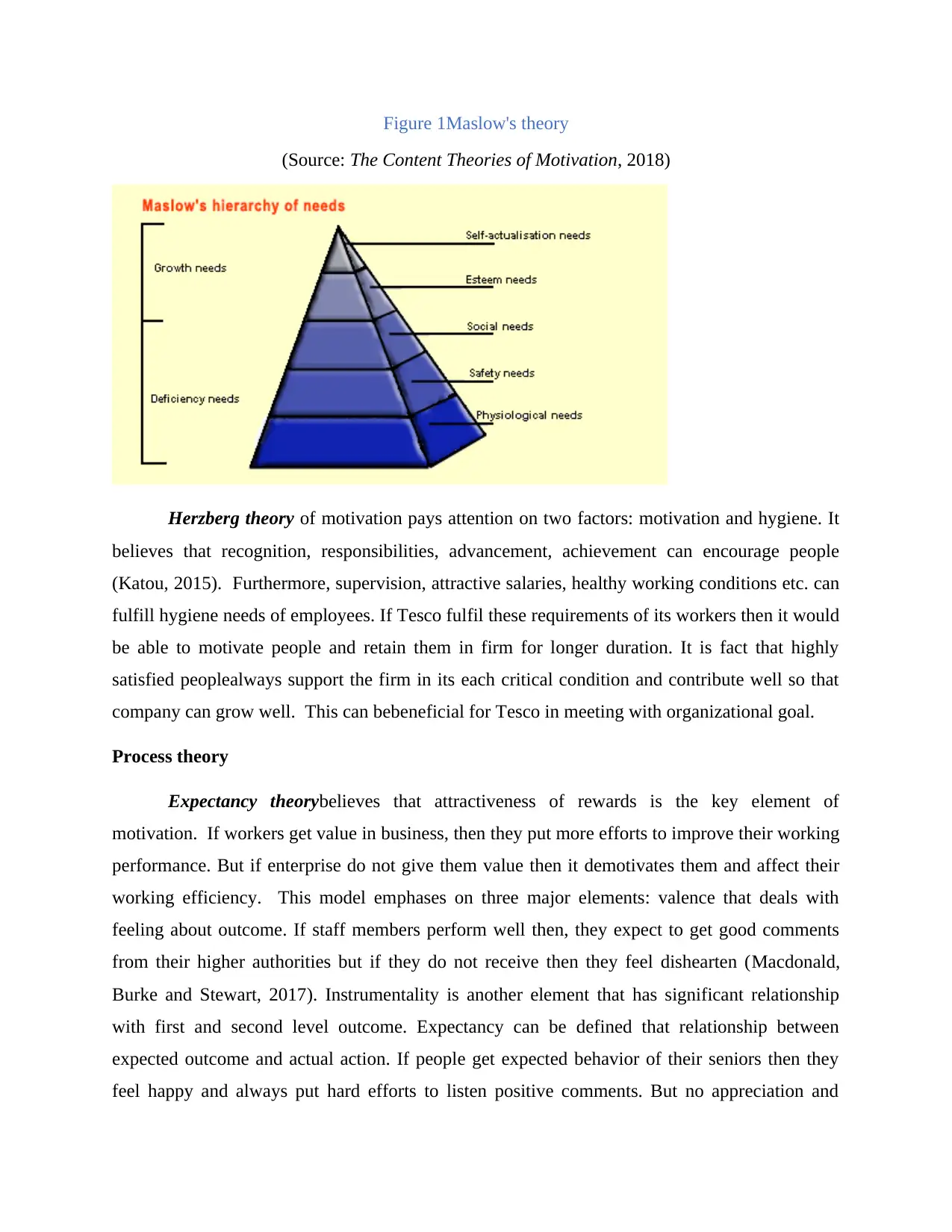
Figure 1Maslow's theory
(Source: The Content Theories of Motivation, 2018)
Herzberg theory of motivation pays attention on two factors: motivation and hygiene. It
believes that recognition, responsibilities, advancement, achievement can encourage people
(Katou, 2015). Furthermore, supervision, attractive salaries, healthy working conditions etc. can
fulfill hygiene needs of employees. If Tesco fulfil these requirements of its workers then it would
be able to motivate people and retain them in firm for longer duration. It is fact that highly
satisfied peoplealways support the firm in its each critical condition and contribute well so that
company can grow well. This can bebeneficial for Tesco in meeting with organizational goal.
Process theory
Expectancy theorybelieves that attractiveness of rewards is the key element of
motivation. If workers get value in business, then they put more efforts to improve their working
performance. But if enterprise do not give them value then it demotivates them and affect their
working efficiency. This model emphases on three major elements: valence that deals with
feeling about outcome. If staff members perform well then, they expect to get good comments
from their higher authorities but if they do not receive then they feel dishearten (Macdonald,
Burke and Stewart, 2017). Instrumentality is another element that has significant relationship
with first and second level outcome. Expectancy can be defined that relationship between
expected outcome and actual action. If people get expected behavior of their seniors then they
feel happy and always put hard efforts to listen positive comments. But no appreciation and
(Source: The Content Theories of Motivation, 2018)
Herzberg theory of motivation pays attention on two factors: motivation and hygiene. It
believes that recognition, responsibilities, advancement, achievement can encourage people
(Katou, 2015). Furthermore, supervision, attractive salaries, healthy working conditions etc. can
fulfill hygiene needs of employees. If Tesco fulfil these requirements of its workers then it would
be able to motivate people and retain them in firm for longer duration. It is fact that highly
satisfied peoplealways support the firm in its each critical condition and contribute well so that
company can grow well. This can bebeneficial for Tesco in meeting with organizational goal.
Process theory
Expectancy theorybelieves that attractiveness of rewards is the key element of
motivation. If workers get value in business, then they put more efforts to improve their working
performance. But if enterprise do not give them value then it demotivates them and affect their
working efficiency. This model emphases on three major elements: valence that deals with
feeling about outcome. If staff members perform well then, they expect to get good comments
from their higher authorities but if they do not receive then they feel dishearten (Macdonald,
Burke and Stewart, 2017). Instrumentality is another element that has significant relationship
with first and second level outcome. Expectancy can be defined that relationship between
expected outcome and actual action. If people get expected behavior of their seniors then they
feel happy and always put hard efforts to listen positive comments. But no appreciation and
⊘ This is a preview!⊘
Do you want full access?
Subscribe today to unlock all pages.

Trusted by 1+ million students worldwide
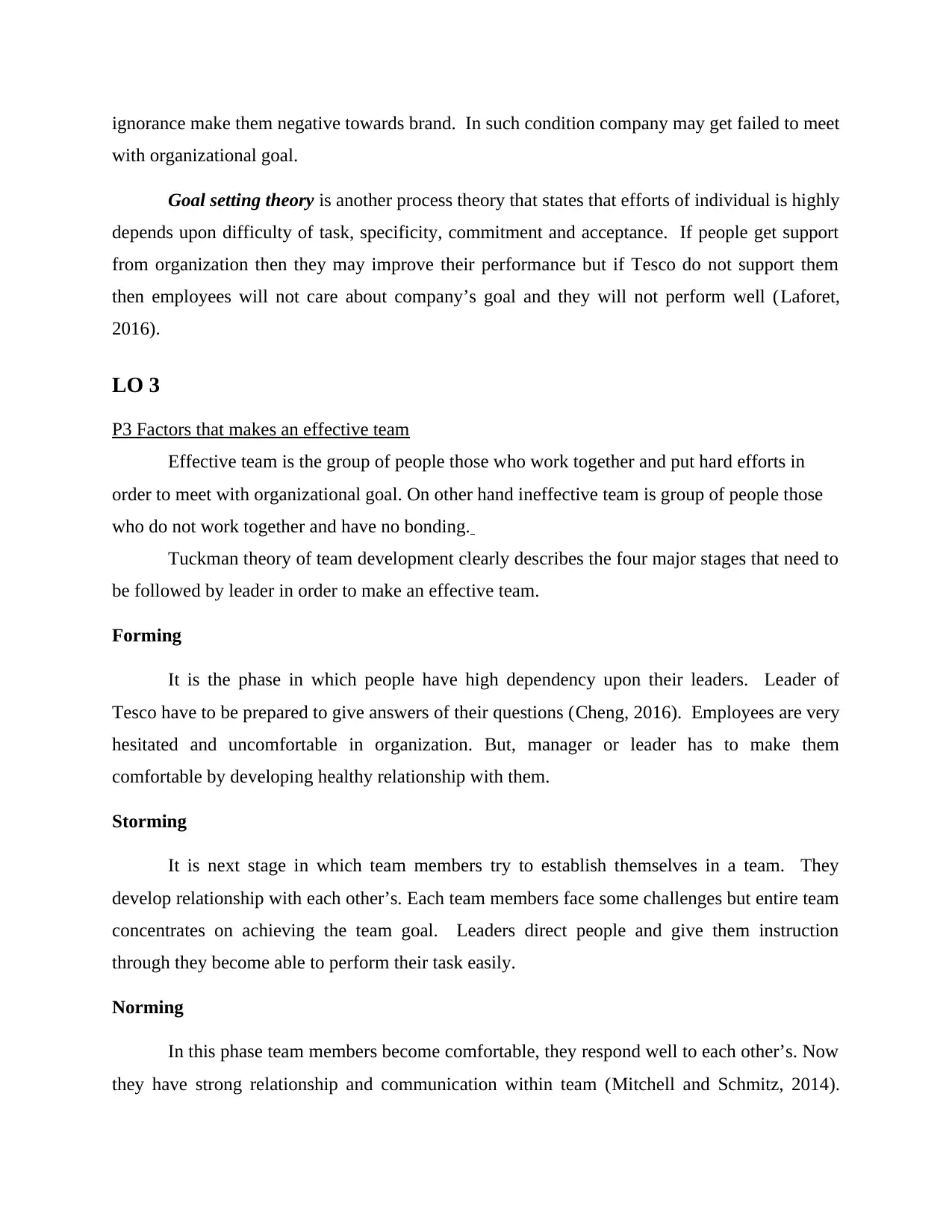
ignorance make them negative towards brand. In such condition company may get failed to meet
with organizational goal.
Goal setting theory is another process theory that states that efforts of individual is highly
depends upon difficulty of task, specificity, commitment and acceptance. If people get support
from organization then they may improve their performance but if Tesco do not support them
then employees will not care about company’s goal and they will not perform well (Laforet,
2016).
LO 3
P3 Factors that makes an effective team
Effective team is the group of people those who work together and put hard efforts in
order to meet with organizational goal. On other hand ineffective team is group of people those
who do not work together and have no bonding.
Tuckman theory of team development clearly describes the four major stages that need to
be followed by leader in order to make an effective team.
Forming
It is the phase in which people have high dependency upon their leaders. Leader of
Tesco have to be prepared to give answers of their questions (Cheng, 2016). Employees are very
hesitated and uncomfortable in organization. But, manager or leader has to make them
comfortable by developing healthy relationship with them.
Storming
It is next stage in which team members try to establish themselves in a team. They
develop relationship with each other’s. Each team members face some challenges but entire team
concentrates on achieving the team goal. Leaders direct people and give them instruction
through they become able to perform their task easily.
Norming
In this phase team members become comfortable, they respond well to each other’s. Now
they have strong relationship and communication within team (Mitchell and Schmitz, 2014).
with organizational goal.
Goal setting theory is another process theory that states that efforts of individual is highly
depends upon difficulty of task, specificity, commitment and acceptance. If people get support
from organization then they may improve their performance but if Tesco do not support them
then employees will not care about company’s goal and they will not perform well (Laforet,
2016).
LO 3
P3 Factors that makes an effective team
Effective team is the group of people those who work together and put hard efforts in
order to meet with organizational goal. On other hand ineffective team is group of people those
who do not work together and have no bonding.
Tuckman theory of team development clearly describes the four major stages that need to
be followed by leader in order to make an effective team.
Forming
It is the phase in which people have high dependency upon their leaders. Leader of
Tesco have to be prepared to give answers of their questions (Cheng, 2016). Employees are very
hesitated and uncomfortable in organization. But, manager or leader has to make them
comfortable by developing healthy relationship with them.
Storming
It is next stage in which team members try to establish themselves in a team. They
develop relationship with each other’s. Each team members face some challenges but entire team
concentrates on achieving the team goal. Leaders direct people and give them instruction
through they become able to perform their task easily.
Norming
In this phase team members become comfortable, they respond well to each other’s. Now
they have strong relationship and communication within team (Mitchell and Schmitz, 2014).
Paraphrase This Document
Need a fresh take? Get an instant paraphrase of this document with our AI Paraphraser
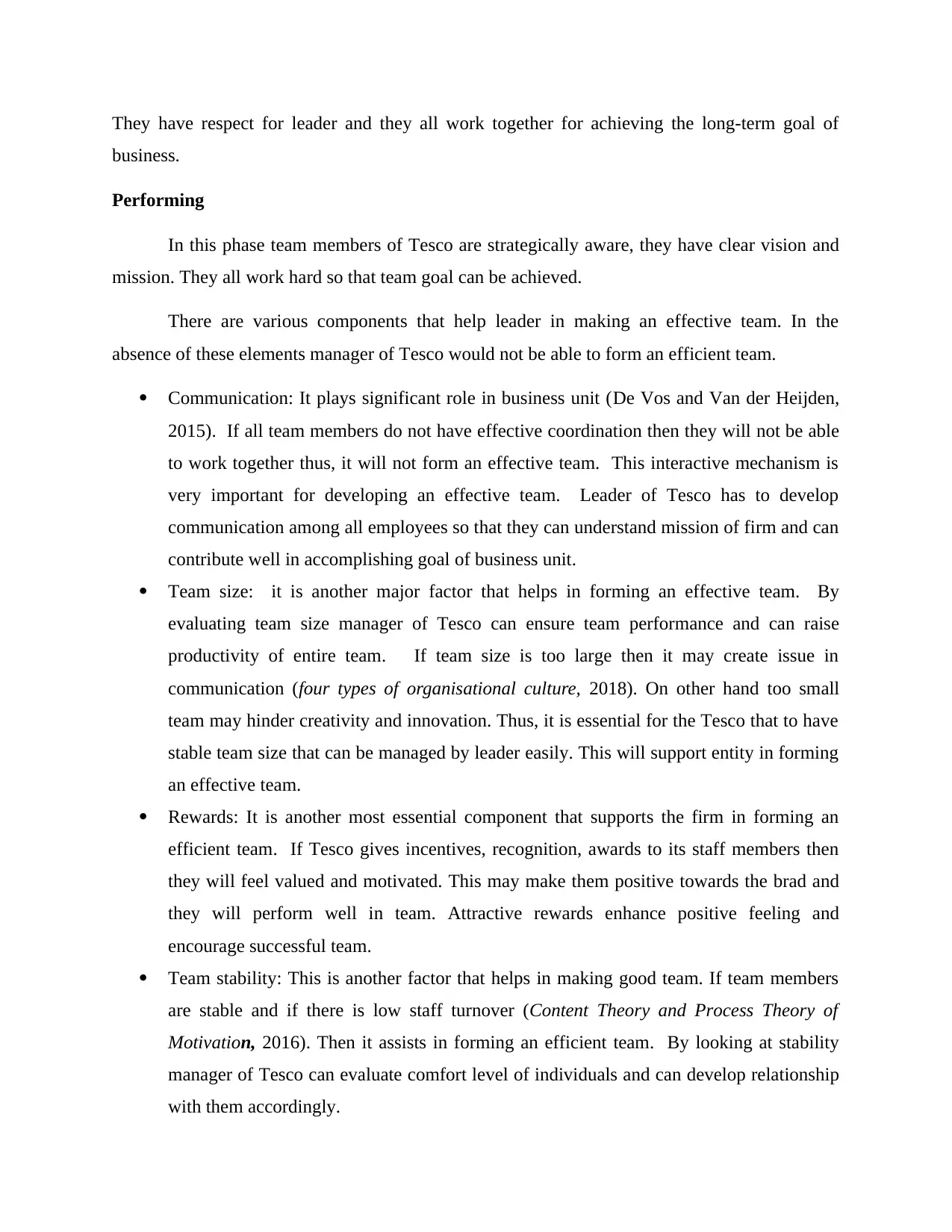
They have respect for leader and they all work together for achieving the long-term goal of
business.
Performing
In this phase team members of Tesco are strategically aware, they have clear vision and
mission. They all work hard so that team goal can be achieved.
There are various components that help leader in making an effective team. In the
absence of these elements manager of Tesco would not be able to form an efficient team.
Communication: It plays significant role in business unit (De Vos and Van der Heijden,
2015). If all team members do not have effective coordination then they will not be able
to work together thus, it will not form an effective team. This interactive mechanism is
very important for developing an effective team. Leader of Tesco has to develop
communication among all employees so that they can understand mission of firm and can
contribute well in accomplishing goal of business unit.
Team size: it is another major factor that helps in forming an effective team. By
evaluating team size manager of Tesco can ensure team performance and can raise
productivity of entire team. If team size is too large then it may create issue in
communication (four types of organisational culture, 2018). On other hand too small
team may hinder creativity and innovation. Thus, it is essential for the Tesco that to have
stable team size that can be managed by leader easily. This will support entity in forming
an effective team.
Rewards: It is another most essential component that supports the firm in forming an
efficient team. If Tesco gives incentives, recognition, awards to its staff members then
they will feel valued and motivated. This may make them positive towards the brad and
they will perform well in team. Attractive rewards enhance positive feeling and
encourage successful team.
Team stability: This is another factor that helps in making good team. If team members
are stable and if there is low staff turnover (Content Theory and Process Theory of
Motivation, 2016). Then it assists in forming an efficient team. By looking at stability
manager of Tesco can evaluate comfort level of individuals and can develop relationship
with them accordingly.
business.
Performing
In this phase team members of Tesco are strategically aware, they have clear vision and
mission. They all work hard so that team goal can be achieved.
There are various components that help leader in making an effective team. In the
absence of these elements manager of Tesco would not be able to form an efficient team.
Communication: It plays significant role in business unit (De Vos and Van der Heijden,
2015). If all team members do not have effective coordination then they will not be able
to work together thus, it will not form an effective team. This interactive mechanism is
very important for developing an effective team. Leader of Tesco has to develop
communication among all employees so that they can understand mission of firm and can
contribute well in accomplishing goal of business unit.
Team size: it is another major factor that helps in forming an effective team. By
evaluating team size manager of Tesco can ensure team performance and can raise
productivity of entire team. If team size is too large then it may create issue in
communication (four types of organisational culture, 2018). On other hand too small
team may hinder creativity and innovation. Thus, it is essential for the Tesco that to have
stable team size that can be managed by leader easily. This will support entity in forming
an effective team.
Rewards: It is another most essential component that supports the firm in forming an
efficient team. If Tesco gives incentives, recognition, awards to its staff members then
they will feel valued and motivated. This may make them positive towards the brad and
they will perform well in team. Attractive rewards enhance positive feeling and
encourage successful team.
Team stability: This is another factor that helps in making good team. If team members
are stable and if there is low staff turnover (Content Theory and Process Theory of
Motivation, 2016). Then it assists in forming an efficient team. By looking at stability
manager of Tesco can evaluate comfort level of individuals and can develop relationship
with them accordingly.
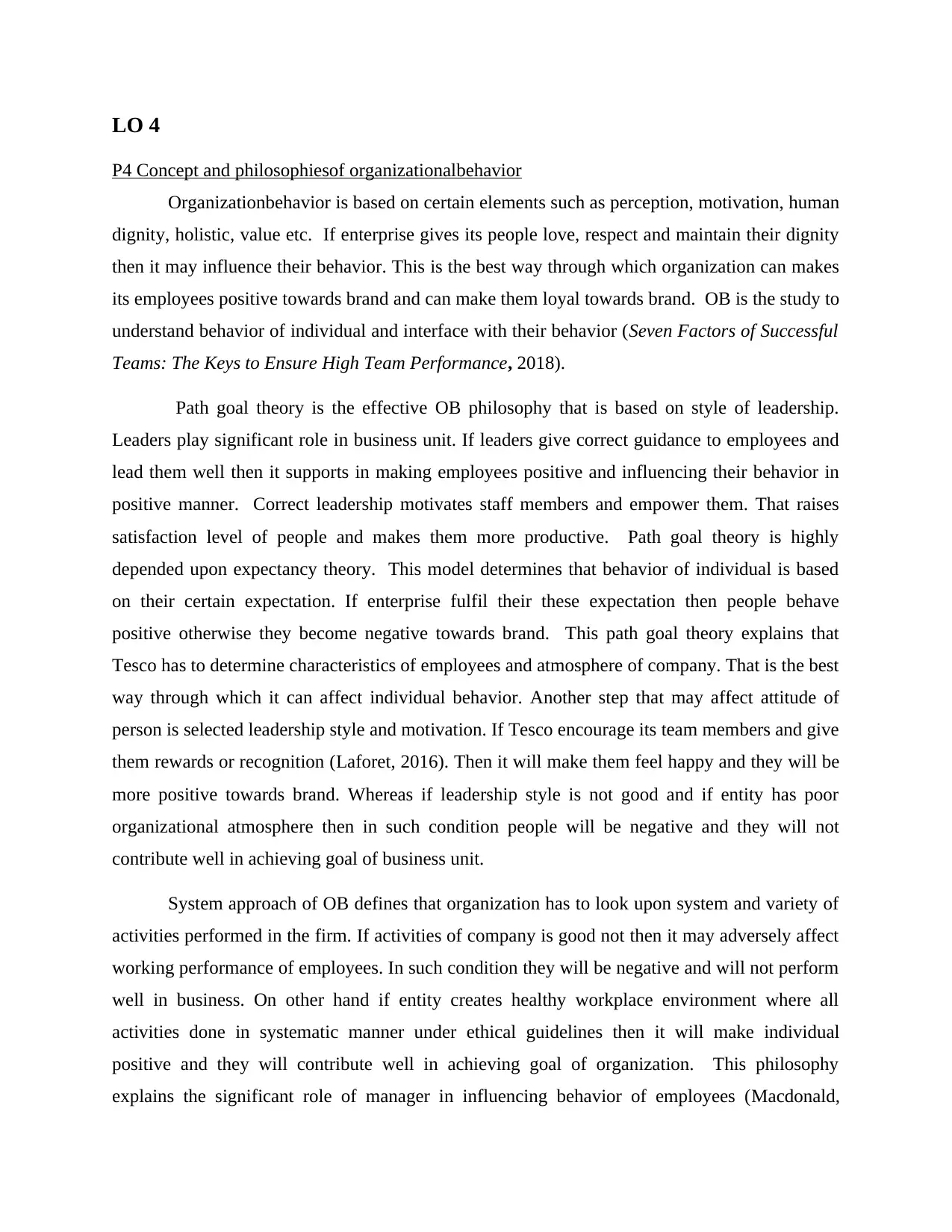
LO 4
P4 Concept and philosophiesof organizationalbehavior
Organizationbehavior is based on certain elements such as perception, motivation, human
dignity, holistic, value etc. If enterprise gives its people love, respect and maintain their dignity
then it may influence their behavior. This is the best way through which organization can makes
its employees positive towards brand and can make them loyal towards brand. OB is the study to
understand behavior of individual and interface with their behavior (Seven Factors of Successful
Teams: The Keys to Ensure High Team Performance, 2018).
Path goal theory is the effective OB philosophy that is based on style of leadership.
Leaders play significant role in business unit. If leaders give correct guidance to employees and
lead them well then it supports in making employees positive and influencing their behavior in
positive manner. Correct leadership motivates staff members and empower them. That raises
satisfaction level of people and makes them more productive. Path goal theory is highly
depended upon expectancy theory. This model determines that behavior of individual is based
on their certain expectation. If enterprise fulfil their these expectation then people behave
positive otherwise they become negative towards brand. This path goal theory explains that
Tesco has to determine characteristics of employees and atmosphere of company. That is the best
way through which it can affect individual behavior. Another step that may affect attitude of
person is selected leadership style and motivation. If Tesco encourage its team members and give
them rewards or recognition (Laforet, 2016). Then it will make them feel happy and they will be
more positive towards brand. Whereas if leadership style is not good and if entity has poor
organizational atmosphere then in such condition people will be negative and they will not
contribute well in achieving goal of business unit.
System approach of OB defines that organization has to look upon system and variety of
activities performed in the firm. If activities of company is good not then it may adversely affect
working performance of employees. In such condition they will be negative and will not perform
well in business. On other hand if entity creates healthy workplace environment where all
activities done in systematic manner under ethical guidelines then it will make individual
positive and they will contribute well in achieving goal of organization. This philosophy
explains the significant role of manager in influencing behavior of employees (Macdonald,
P4 Concept and philosophiesof organizationalbehavior
Organizationbehavior is based on certain elements such as perception, motivation, human
dignity, holistic, value etc. If enterprise gives its people love, respect and maintain their dignity
then it may influence their behavior. This is the best way through which organization can makes
its employees positive towards brand and can make them loyal towards brand. OB is the study to
understand behavior of individual and interface with their behavior (Seven Factors of Successful
Teams: The Keys to Ensure High Team Performance, 2018).
Path goal theory is the effective OB philosophy that is based on style of leadership.
Leaders play significant role in business unit. If leaders give correct guidance to employees and
lead them well then it supports in making employees positive and influencing their behavior in
positive manner. Correct leadership motivates staff members and empower them. That raises
satisfaction level of people and makes them more productive. Path goal theory is highly
depended upon expectancy theory. This model determines that behavior of individual is based
on their certain expectation. If enterprise fulfil their these expectation then people behave
positive otherwise they become negative towards brand. This path goal theory explains that
Tesco has to determine characteristics of employees and atmosphere of company. That is the best
way through which it can affect individual behavior. Another step that may affect attitude of
person is selected leadership style and motivation. If Tesco encourage its team members and give
them rewards or recognition (Laforet, 2016). Then it will make them feel happy and they will be
more positive towards brand. Whereas if leadership style is not good and if entity has poor
organizational atmosphere then in such condition people will be negative and they will not
contribute well in achieving goal of business unit.
System approach of OB defines that organization has to look upon system and variety of
activities performed in the firm. If activities of company is good not then it may adversely affect
working performance of employees. In such condition they will be negative and will not perform
well in business. On other hand if entity creates healthy workplace environment where all
activities done in systematic manner under ethical guidelines then it will make individual
positive and they will contribute well in achieving goal of organization. This philosophy
explains the significant role of manager in influencing behavior of employees (Macdonald,
⊘ This is a preview!⊘
Do you want full access?
Subscribe today to unlock all pages.

Trusted by 1+ million students worldwide
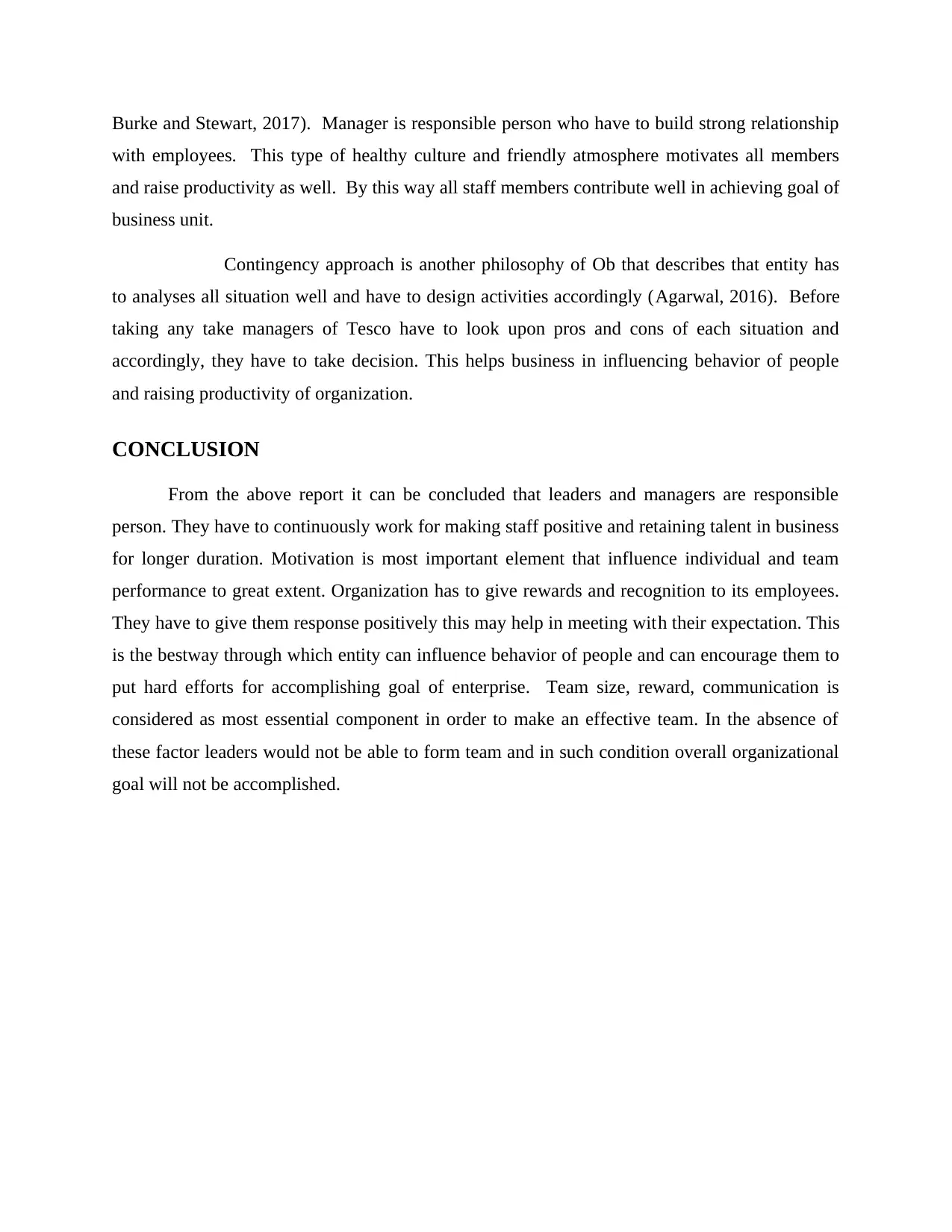
Burke and Stewart, 2017). Manager is responsible person who have to build strong relationship
with employees. This type of healthy culture and friendly atmosphere motivates all members
and raise productivity as well. By this way all staff members contribute well in achieving goal of
business unit.
Contingency approach is another philosophy of Ob that describes that entity has
to analyses all situation well and have to design activities accordingly (Agarwal, 2016). Before
taking any take managers of Tesco have to look upon pros and cons of each situation and
accordingly, they have to take decision. This helps business in influencing behavior of people
and raising productivity of organization.
CONCLUSION
From the above report it can be concluded that leaders and managers are responsible
person. They have to continuously work for making staff positive and retaining talent in business
for longer duration. Motivation is most important element that influence individual and team
performance to great extent. Organization has to give rewards and recognition to its employees.
They have to give them response positively this may help in meeting with their expectation. This
is the bestway through which entity can influence behavior of people and can encourage them to
put hard efforts for accomplishing goal of enterprise. Team size, reward, communication is
considered as most essential component in order to make an effective team. In the absence of
these factor leaders would not be able to form team and in such condition overall organizational
goal will not be accomplished.
with employees. This type of healthy culture and friendly atmosphere motivates all members
and raise productivity as well. By this way all staff members contribute well in achieving goal of
business unit.
Contingency approach is another philosophy of Ob that describes that entity has
to analyses all situation well and have to design activities accordingly (Agarwal, 2016). Before
taking any take managers of Tesco have to look upon pros and cons of each situation and
accordingly, they have to take decision. This helps business in influencing behavior of people
and raising productivity of organization.
CONCLUSION
From the above report it can be concluded that leaders and managers are responsible
person. They have to continuously work for making staff positive and retaining talent in business
for longer duration. Motivation is most important element that influence individual and team
performance to great extent. Organization has to give rewards and recognition to its employees.
They have to give them response positively this may help in meeting with their expectation. This
is the bestway through which entity can influence behavior of people and can encourage them to
put hard efforts for accomplishing goal of enterprise. Team size, reward, communication is
considered as most essential component in order to make an effective team. In the absence of
these factor leaders would not be able to form team and in such condition overall organizational
goal will not be accomplished.
Paraphrase This Document
Need a fresh take? Get an instant paraphrase of this document with our AI Paraphraser
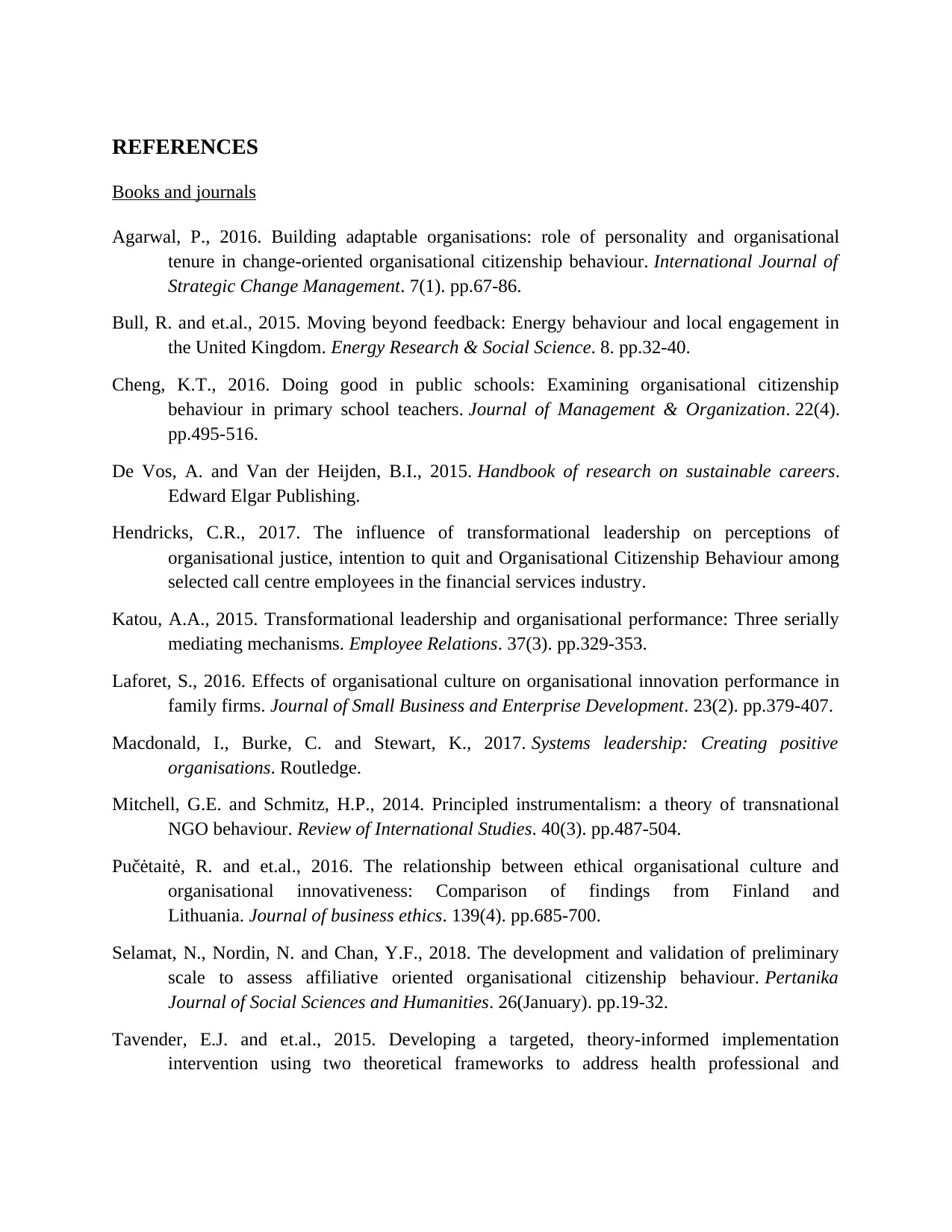
REFERENCES
Books and journals
Agarwal, P., 2016. Building adaptable organisations: role of personality and organisational
tenure in change-oriented organisational citizenship behaviour. International Journal of
Strategic Change Management. 7(1). pp.67-86.
Bull, R. and et.al., 2015. Moving beyond feedback: Energy behaviour and local engagement in
the United Kingdom. Energy Research & Social Science. 8. pp.32-40.
Cheng, K.T., 2016. Doing good in public schools: Examining organisational citizenship
behaviour in primary school teachers. Journal of Management & Organization. 22(4).
pp.495-516.
De Vos, A. and Van der Heijden, B.I., 2015. Handbook of research on sustainable careers.
Edward Elgar Publishing.
Hendricks, C.R., 2017. The influence of transformational leadership on perceptions of
organisational justice, intention to quit and Organisational Citizenship Behaviour among
selected call centre employees in the financial services industry.
Katou, A.A., 2015. Transformational leadership and organisational performance: Three serially
mediating mechanisms. Employee Relations. 37(3). pp.329-353.
Laforet, S., 2016. Effects of organisational culture on organisational innovation performance in
family firms. Journal of Small Business and Enterprise Development. 23(2). pp.379-407.
Macdonald, I., Burke, C. and Stewart, K., 2017. Systems leadership: Creating positive
organisations. Routledge.
Mitchell, G.E. and Schmitz, H.P., 2014. Principled instrumentalism: a theory of transnational
NGO behaviour. Review of International Studies. 40(3). pp.487-504.
Pučėtaitė, R. and et.al., 2016. The relationship between ethical organisational culture and
organisational innovativeness: Comparison of findings from Finland and
Lithuania. Journal of business ethics. 139(4). pp.685-700.
Selamat, N., Nordin, N. and Chan, Y.F., 2018. The development and validation of preliminary
scale to assess affiliative oriented organisational citizenship behaviour. Pertanika
Journal of Social Sciences and Humanities. 26(January). pp.19-32.
Tavender, E.J. and et.al., 2015. Developing a targeted, theory-informed implementation
intervention using two theoretical frameworks to address health professional and
Books and journals
Agarwal, P., 2016. Building adaptable organisations: role of personality and organisational
tenure in change-oriented organisational citizenship behaviour. International Journal of
Strategic Change Management. 7(1). pp.67-86.
Bull, R. and et.al., 2015. Moving beyond feedback: Energy behaviour and local engagement in
the United Kingdom. Energy Research & Social Science. 8. pp.32-40.
Cheng, K.T., 2016. Doing good in public schools: Examining organisational citizenship
behaviour in primary school teachers. Journal of Management & Organization. 22(4).
pp.495-516.
De Vos, A. and Van der Heijden, B.I., 2015. Handbook of research on sustainable careers.
Edward Elgar Publishing.
Hendricks, C.R., 2017. The influence of transformational leadership on perceptions of
organisational justice, intention to quit and Organisational Citizenship Behaviour among
selected call centre employees in the financial services industry.
Katou, A.A., 2015. Transformational leadership and organisational performance: Three serially
mediating mechanisms. Employee Relations. 37(3). pp.329-353.
Laforet, S., 2016. Effects of organisational culture on organisational innovation performance in
family firms. Journal of Small Business and Enterprise Development. 23(2). pp.379-407.
Macdonald, I., Burke, C. and Stewart, K., 2017. Systems leadership: Creating positive
organisations. Routledge.
Mitchell, G.E. and Schmitz, H.P., 2014. Principled instrumentalism: a theory of transnational
NGO behaviour. Review of International Studies. 40(3). pp.487-504.
Pučėtaitė, R. and et.al., 2016. The relationship between ethical organisational culture and
organisational innovativeness: Comparison of findings from Finland and
Lithuania. Journal of business ethics. 139(4). pp.685-700.
Selamat, N., Nordin, N. and Chan, Y.F., 2018. The development and validation of preliminary
scale to assess affiliative oriented organisational citizenship behaviour. Pertanika
Journal of Social Sciences and Humanities. 26(January). pp.19-32.
Tavender, E.J. and et.al., 2015. Developing a targeted, theory-informed implementation
intervention using two theoretical frameworks to address health professional and
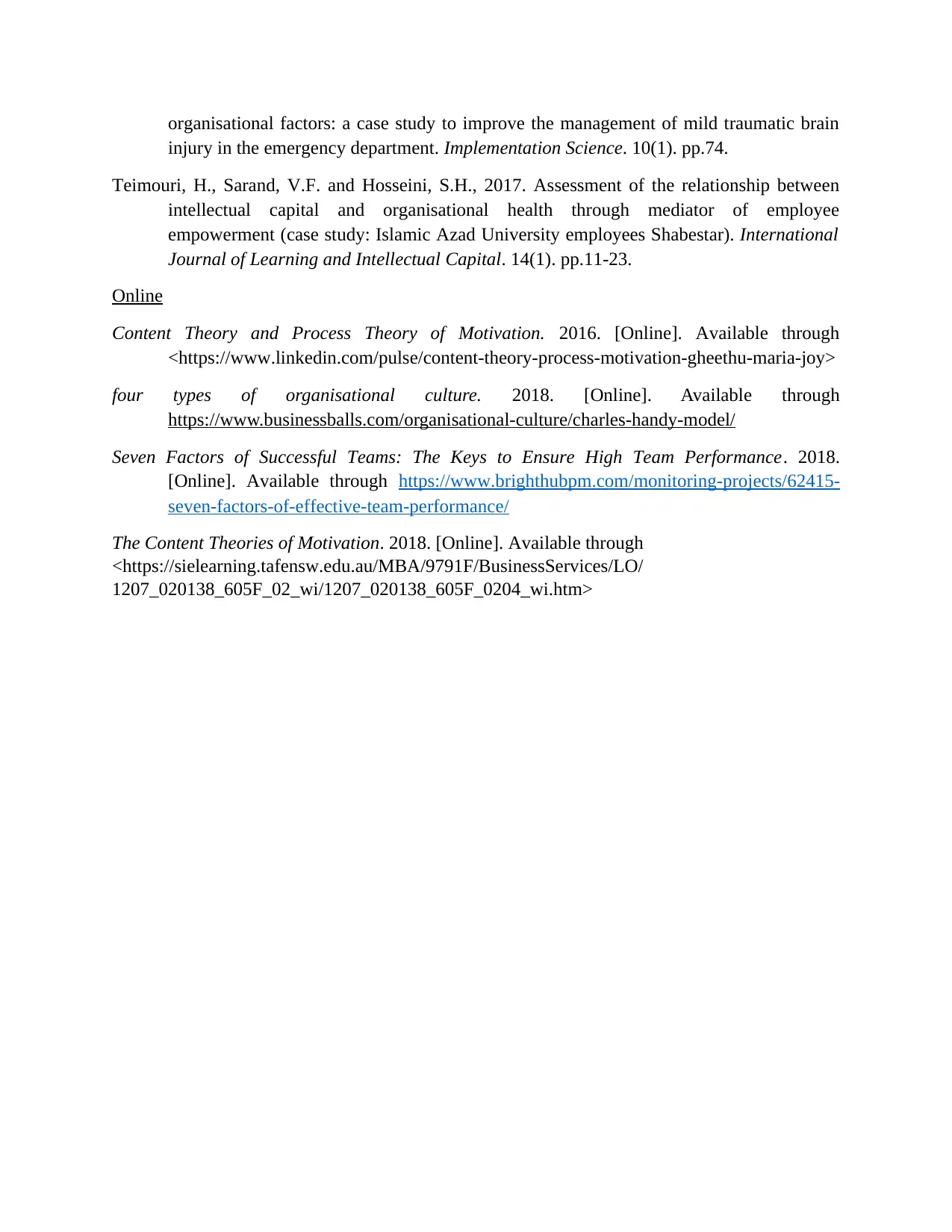
organisational factors: a case study to improve the management of mild traumatic brain
injury in the emergency department. Implementation Science. 10(1). pp.74.
Teimouri, H., Sarand, V.F. and Hosseini, S.H., 2017. Assessment of the relationship between
intellectual capital and organisational health through mediator of employee
empowerment (case study: Islamic Azad University employees Shabestar). International
Journal of Learning and Intellectual Capital. 14(1). pp.11-23.
Online
Content Theory and Process Theory of Motivation. 2016. [Online]. Available through
<https://www.linkedin.com/pulse/content-theory-process-motivation-gheethu-maria-joy>
four types of organisational culture. 2018. [Online]. Available through
https://www.businessballs.com/organisational-culture/charles-handy-model/
Seven Factors of Successful Teams: The Keys to Ensure High Team Performance. 2018.
[Online]. Available through https://www.brighthubpm.com/monitoring-projects/62415-
seven-factors-of-effective-team-performance/
The Content Theories of Motivation. 2018. [Online]. Available through
<https://sielearning.tafensw.edu.au/MBA/9791F/BusinessServices/LO/
1207_020138_605F_02_wi/1207_020138_605F_0204_wi.htm>
injury in the emergency department. Implementation Science. 10(1). pp.74.
Teimouri, H., Sarand, V.F. and Hosseini, S.H., 2017. Assessment of the relationship between
intellectual capital and organisational health through mediator of employee
empowerment (case study: Islamic Azad University employees Shabestar). International
Journal of Learning and Intellectual Capital. 14(1). pp.11-23.
Online
Content Theory and Process Theory of Motivation. 2016. [Online]. Available through
<https://www.linkedin.com/pulse/content-theory-process-motivation-gheethu-maria-joy>
four types of organisational culture. 2018. [Online]. Available through
https://www.businessballs.com/organisational-culture/charles-handy-model/
Seven Factors of Successful Teams: The Keys to Ensure High Team Performance. 2018.
[Online]. Available through https://www.brighthubpm.com/monitoring-projects/62415-
seven-factors-of-effective-team-performance/
The Content Theories of Motivation. 2018. [Online]. Available through
<https://sielearning.tafensw.edu.au/MBA/9791F/BusinessServices/LO/
1207_020138_605F_02_wi/1207_020138_605F_0204_wi.htm>
⊘ This is a preview!⊘
Do you want full access?
Subscribe today to unlock all pages.

Trusted by 1+ million students worldwide
1 out of 13
Related Documents
Your All-in-One AI-Powered Toolkit for Academic Success.
+13062052269
info@desklib.com
Available 24*7 on WhatsApp / Email
![[object Object]](/_next/static/media/star-bottom.7253800d.svg)
Unlock your academic potential
Copyright © 2020–2026 A2Z Services. All Rights Reserved. Developed and managed by ZUCOL.





